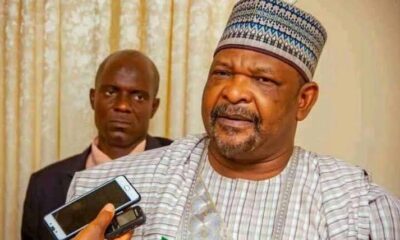- Govt Concludes Work on 2019 Budget, FEC Gets Document Soon
President Muhammadu Buhari may present the 2019 Appropriation Bill to the National Assembly later this month.
Our correspondent learnt on Sunday that work on the fiscal document had reached an advanced stage with the conclusion of defence by Ministries, Departments and Agencies on Saturday.
It was further learnt that what was left was for the MDAs to effect the corrections made during the defence and submit clean copies to the Budget Office.
A top government official told our correspondent on condition of anonymity on Sunday that the Budget Office would, thereafter, present the document to Buhari who would present it to the Federal Executive Council for approval.
It is after the council’s approval that a date will be fixed for the presentation of the budget to the National Assembly.
It may be recalled that Buhari presented the 2018 budget proposal to a joint session of the National Assembly on November 7, 2017.
The source, however, said the Executive arm of the government alone should not take the blame for the budget presentation coming later than the date it was presented last year.
He said federal lawmakers should also share in the blame for allegedly being absent at their duty posts most of the time.
He cited an example of the Medium-Term Expenditure Framework, which he claimed could not be submitted to the National Assembly when it was ready because of the lawmakers’ absence.
He described the approval of the MTEF as critical to the presentation of the budget itself.
The government official said, “The budget will definitely be submitted this month. The bilaterals have been concluded yesterday (Saturday).
“All the Ministries, Departments and Agencies have defended their budgets. They started the defence on Monday and ended it on Saturday.
“It is now a matter of them fine-tuning the issues that have been raised, clean up and submit to the Budget Office. Then the Budget Office will confirm that it conforms to what was agreed, compile them and send.
“You also know that the MTEF is before the National Assembly. They have not approved it yet. The MTEF is a precursor to the budget itself. While the lawmakers are working on it, those concerned will also be packaging the budget. Once they approve it, it is just a matter of submitting.
“When people talk about late submission of the budget, they don’t talk about the non-availability of members of the National Assembly. They always take off at critical times. When the MTEF was ready, they were not around to receive it.
“If people who are preparing the documents know that those they are taking them to are not around, they will relax and just do it at their own pace. But when they know that those they want to submit to are around, they will do it in good time.
“The moment the lawmakers resumed, the MTEF was ready. The President sent it to them but you know some of them are outside the country. They will come in, address one or two issues and take off again.
“The summary of it is that the bilaterals have been concluded. All the MDAs have defended their budgets. They will go back and put them in proper forms before sending to the Budget Office.
“Once the Budget Office is through with it, it is a question of taking it to the Federal Executive Council. Once the council approves, the President will present it to the National Assembly.
“It is very likely that it will be presented this month. The main thing is just the bilaterals, which have already been concluded.”
When contacted on the telephone on Sunday, the Special Adviser (Media) to the Minister of Budget and National Planning, Mr Akpandem James, confirmed to our correspondent that the government was almost through with the budget preparation.
He expressed the conviction that the document would soon be presented to FEC.
“I can confirm to you that work has reached an advanced stage on the 2019 Budget. We have gone far in the preparation. The President will soon present it to the Federal Executive Council for approval,” he said.

 Forex2 weeks ago
Forex2 weeks ago


 Naira2 weeks ago
Naira2 weeks ago
 Billionaire Watch2 weeks ago
Billionaire Watch2 weeks ago




 Naira2 weeks ago
Naira2 weeks ago




 Naira2 weeks ago
Naira2 weeks ago




 Naira4 weeks ago
Naira4 weeks ago


 Naira6 days ago
Naira6 days ago
 Banking Sector4 weeks ago
Banking Sector4 weeks ago




















